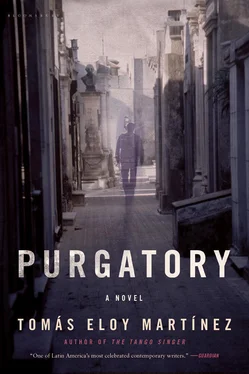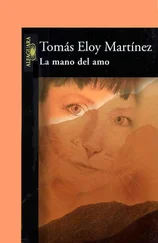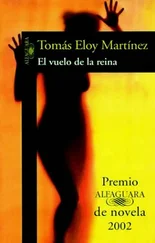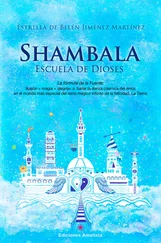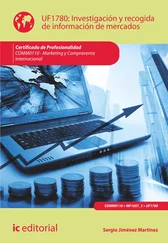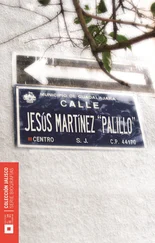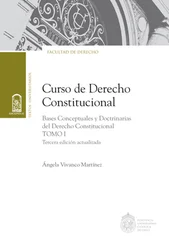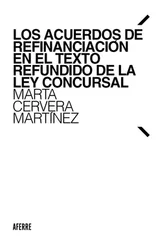‘Cartographers,’ Emilia said. ‘Why don’t you check our credentials?’
‘All right, I’ll let you go through,’ the sergeant conceded. ‘But just remember, we’ve got our eyes on you. You still need to get past the checkpoint at Huacra. If they turn you back, I wouldn’t like to be in your shoes.’
The military checkpoint at Huacra seemed deserted. The stifling silence, the empty, almost surreal sentry boxes felt strangely jarring. The checkpoint marked the border between two provinces and was usually patrolled by at least twenty soldiers yet they could not see a living soul. The first red rays of dawn rose up on the left. A bitter cold leached through the canvas sides of the jeep. They drove on as far as the Río El Abra, or what they assumed was the river — a dry gorge with a crude concrete bridge they could just make out in the distance. Simón left the engine running and they waited for it to be light before beginning preliminary sketches for the map. ‘Have you checked the scale?’ Emilia asked. ‘See that embankment next to the bridge, we need to choose a symbol. Don’t fall asleep on me, Simón.’
Her husband lit a cigarette to keep himself awake but stubbed it out almost immediately. ‘There’s a terrible smell,’ he said. It was true. The stench was everywhere, spread across the landscape like a sheet. ‘Maybe it’s the vegetation,’ Emilia said. ‘Sometimes the trees are covered with fungus and bird droppings.’ ‘But it’s winter,’ her husband said. ‘The trees are bare, the whole place is a wasteland.’ ‘Then it must be putrefaction from the river,’ she said.
Rats, she remembered, abandoned their young under bridges when they went foraging for food. Who knew how many starving animals were under the bridge devouring each other? But the smell shifted and changed; sometimes it was like blood, at other times like breath flecked with spittle from a toothless mouth.
Smells are supposed to thrive in the heat, but the stench that morning seemed to draw its power from the chill air: it was a miasma which, instead of dissipating, seemed to become more dense, more tangible. Ice crystals formed on the windows of the jeep and Emilia’s joints began to ache. The air was slowly freezing and she wished that the smell, too, would freeze into flakes of mica. The wasteland was so monstrous, so absolute, that in the grey light of dawn things seemed to disappear, to vanish leaving only desolation: infinite placentas of abandonment, wounds that gaped beneath the jeep. ‘We’re going to get nowhere,’ said Emilia. ‘That’s because we’re already nowhere,’ said Simón.
When, finally, it was light enough to see, they could make out shadows moving towards the jeep, crawling along, scattering the loose gravel of the dirt road. Emilia had no time for horror movies or fantastical stories about supernatural creatures, but the creatures that morning reeked of sulphur and crackled like a cauldron of cicadas, a sound that came from the dawn of time, the sound of the wilderness spawning its poison.
‘Stay calm. There are people out there,’ Simón whispered, checking the doors to the jeep to make sure they were locked. As he did so, someone outside started jerking one of the door handles furiously.
The dawn came slowly. For a long time, it was merely a distant violet glow. Wind whipped sand against the jeep. A new, more piercing sound split the air. This moan, this whimper — whatever it was — grew louder; there were three, four voices coming from all directions, raucous and piercing. Suddenly they stopped, but only so the voices could come together in a shrill chorus like a needle that drilled into their eardrums.
‘There are people circling,’ Simón said again.
He took out the barbecue knife he always carried with him and climbed out of the jeep. The half-light of dawn was darker than the night had been and Emilia turned on the headlights. A woman dressed in rags and tatters was standing on the side of the road, rubbing her arms to keep warm. Next to her, two arthritic old women cradled a bundle wrapped in newspapers. Behind them, a woman with a mane of hair was trying to rouse a man sprawled on the ground with gutteral shrieks. A man stumbled along the dirt road towards the jeep wearing a threadbare raincoat that served little purpose since he was naked underneath. Behind him, another man pushing himself along on his hands and knees. Under the bridge were others, urinating, defecating. There were no fires, no shelter to keep them warm, nothing but the rage of that stench which was deeper than the night itself.
When the creatures saw Simón walking towards them, they howled piteous, meaningless words. The skin of the man in the raincoat was black with filth and grime. From a distance, he did not seem human. Emilia, recognising that they were as sick with dread as she was, got out of the jeep, throwing a blanket around her shoulders. As she approached the two old women, she heard a feeble wail and realised that wrapped in the bundle of newspapers was a baby. She offered them the blanket without a moment’s hesitation. As she walked the scant hundred metres from the jeep to where they stood, day had finally broken. The sun now rose at a dizzying speed as if to compensate for the delay. An icy wind whistled, whipping up the sand.
In the distance, the strange creatures went on howling the same words over and over, the tone, the volume shifting. The guy with the frizzy hair jus’ shitted hi’self. Or: ’ey, you, gi’s some money for a drink. Can’ you see ’m dyin’ of thirst? And in unison. We’re all Raya morada 7here, that’s why they rounded us with nets like stray dogs. Raya morada, Raya morada . Even more incomprehensible was the strange behaviour of the men, who threatened each other, bared their toothless gums or sobbed as though some terrible memory had crawled up their noses. Pressing a finger to one nostril they blew their noses then stopped to see whether the snot had landed on the gravel or their clothes. When they had calmed down, the woman with the shock of hair, who was easily the most articulate, explained to Simón and Emilia that they had been picked up in military raids shortly before midnight from the doorways and the church porches where they slept.
There were some eighteen or twenty of them and they had been living on charity. Some pretended to be mad, making people laugh playing guitars that were nothing more than broom handles or writing poems on pieces of newspaper. Others were genuinely mad. The man in the threadbare raincoat believed he had been transported back from the Last Judgement to a time when there was no God, since there was no need of God now. He believed he was surrounded by angels through whom he could communicate with the dead and he was never bored because he spent his time talking to them about family secrets and mysterious diseases.
They had been shipped out to Tucumán in trucks used by dog-catchers and dumped in the bleak wasteland here in Catamarca, under the El Abra Bridge, between piles of hospital waste — bloody bandages, cotton pads smeared with pus, vesicles, appendixes, pieces of stomach, ulcerated intestines, kidneys with tumours and the other insults visited by disease on the human body. Even on the bitterest nights, clouds of blowflies laid their eggs in the waste and flocks of carrion hawks fought viciously for scraps of human detritus. The feverish stench drove out all oxygen and clung to the bodies of these beggars with a tenacity that would last forever.
Simón offered to drive them in groups to the military checkpoint at Huacra. He was prepared to put off starting work on the map until the afternoon and spend the morning making as many trips as necessary, but they told him that two of the men had already made the trip during the night only to arrive, their feet bloody and raw, and be bundled into an army truck and brought straight back out into the desert. Simón suggested it might be better to go for help to a village called Bañado de Ovanta, twenty kilometres east. ‘I’ll go with you,’ said Emilia. ‘We need to bring back bread, coffee and blankets for these people before they die.’
Читать дальше
